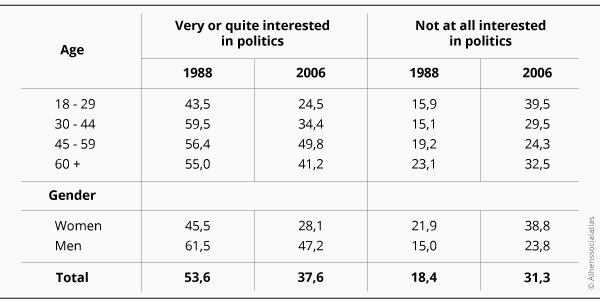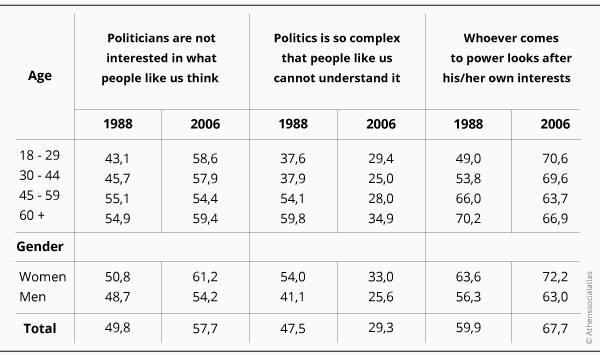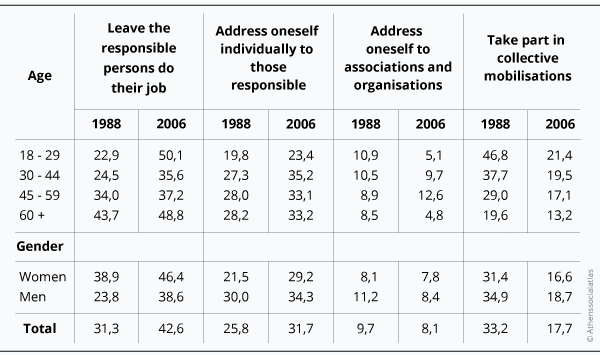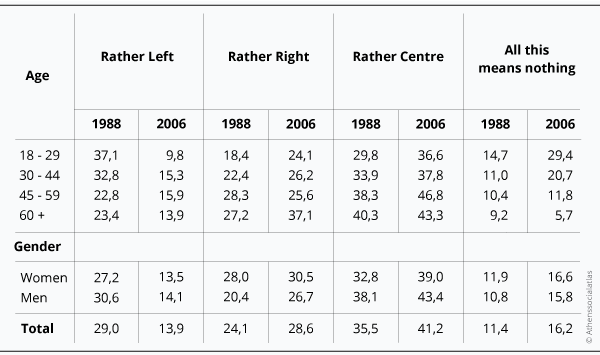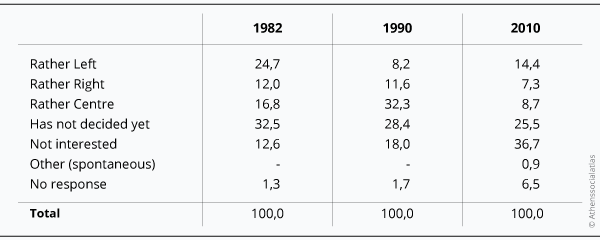Youth and politics: The political involvement of the young prior to the crisis
Pantelidou Maloutas Maro
Politics
2015 | Dec
Citizens’ trust in the political system and institutions in Greece was in systematic decline since the early 1990s and up to the crisis. At the same time, the young increasingly distanced themselves from politics, as both their political interest and their level of actual political involvement were much smaller compared to young people in previous eras and to their contemporaries in middle-age.
All empirical surveys of this period attest that Greek youth, as is the case with other young Europeans, is mainly individualistic, with limited socio-political concerns and reduced interest for and participation in political collectivities. In parallel, cynicism and a sense of futility as to the effectiveness of a possible political intervention seem to be on the increase. The general social, political and cultural conditions dictated a climate of complacency and disengagement, while young people mainly channelled their interests and their energy towards other directions, in distinct contrast to their parents’ generation. The crisis, a very strong factor for (re)socialisation, played a significant role as we will see. However, the December 2008 events caused surprise, precisely because they did not fit the collective characteristics typically assigned to the younger generations at that time. Something had already begun to change.
Young people and political generation
Although the young are not a homogenous social category, we could generalise when referring to them as an agent of political action, to the extent that there is an essential homogenising factor in the political expression of that group. This factor relates to historical instances, when this particular age group experienced significant socialisation events. As a result, young individuals of a specific generation have great similarities among them, mainly in their political understanding, but also in their political attitudes [1]. Furthermore, based on the theory of social representations (Moscovici 1984), we assume that members of the same generation share common representations of the world also because of the way they have been shaped as a generation through the media. These commonalities are extremely important, because they bring together a group of members of the same age category, who acquire specific communication codes and common ways of assessing and understanding the world (Potter 2005, p. 205).
In past decades, the social identity of successive cohorts of young people was shaped during their childhood and adolescence within an environment of disregard for politics and collectiveness, in a general atmosphere promoting privatisation and individualisation and a media framework that promoted and favoured specific lifestyles and standards of social and political involvement. This was systematically reflected in the comparatively low percentages of young people’s political participation. A phenomenon not exclusively related to the Greek political culture, despite its particularities, while at the European level, the change in the political characteristics of electorates is fully documented. Some authors connect this change to the appearance of post-materialist values after the war (Inglehart 1977, 1997) while others link it to the gradual consolidation of post-modern identity trends through which today’s youth expresses itself during the current phase of globalisation and capitalist growth (Gibbins 1989). The prevailing trend is that of a decline in all traditional forms of political participation and a parallel decline in party identification. In addition, the importance of class voting as well as the explanatory weight of ideological self-placement in voting behaviour have also declined. These trends are typically observed more in younger individuals, while “generation replacement” is ultimately proven to be a central driving force of political change (Hooghe 2004). This is why there is a growing interest in studying the political characteristics of the young.
It should be further noted that, when referring to the relationship “youth and politics”, the underlying assumption is that age has an impact on political behaviour and in particular on political participation, as is widely documented in research. However, our approach should take into account at least two parameters, which form the sociological dimensions of age and thus influence the definition of political behaviour: a) age as an expression of the political generation to which each subject belongs b) age as a position in the “cycle of life”, which implies different roles (Παντελίδου Μαλούτα 2012). Usually, research focuses on what influences the young, however we should not ignore the effect of the life cycle position, which varies among different societies according to their economic development, nor the class position and gender of same-age agents of political action. For example, unemployment drives many young individuals back to their family home, creating a condition that affects their world-view, while in general young women leave the family home later than young men etc.
In any case, young people get involved in the political process when they feel that political events affect them. The main differentiating factor from one generation to the next always has to do with what the members of each generation think that mainly concerns them. Specifically, it appears that although the Left-Right divide shaped electoral behaviour in many European societies until the 1990s (Van der Eijk & Franklin, 1996), its importance decreased along with the decline of class-related voting (Franklin, et al 1992). This is particularly evident among younger voters. Similarly, the young seem to be the main driving force behind the so-called “thematic vote” (Rose & Mc Allister 1986), that has replaced older, class or ideological, divides.
According to empirical political research findings, structural factors define vote orientation more for voters who were politically socialised prior to 1960, while self-placement on the Left-Right divide mostly influences the vote of those who were socialised until 1990 (Van de Brug 2010). Finally, there are indications that the thematic voting in Greece mostly concerns (young) voters socialised politically in their adolescence, after 2000.
Socialisation and re-socialisation of the young
The importance of each period’s socialisation messages as well as the early formative experiences of each political generation are crucial to the way in which each generation manages subsequent stimuli. The “concerns” of the young after the 1990s are more individualised and lifestyle-related, as opposed to their parents’ generation, who were mostly society-oriented (Παντελίδου Μαλούτα 2012). Until recently, all available data on age pointed to substantial changes in basic socialisation messages typifying different generations, due to the changes observed in the local and international social and cultural context as a result of globalisation and the integration of Greek society in supranational structures. This created various and often contradictory political socialisation messages, which in fact manifested themselves beyond political behaviour.
Indeed, the socio-political character of the young in the early 2000s had significantly changed compared to previous generations of young individuals. These changes are both quantitative (less political interest and limited political involvement) and ideological (much lower rates of a leftist identity), and they are linked to value changes. A 2006 research project comparing 1988 and 2006 data shows a young population with right-wing tendencies (decline in leftist identity between 18-29 year-olds from 37.1% in 1988 to 9.8% in 2006); more cynical and negative towards the political system (“whoever is in power always sees to his/her own interests”, 49% in 1988, 70.6% in 2006); with increased declaration of absolute political indifference (15.9% in 1988, 39.5% in 2006) and much lower participation, across all indicators [2]. Indeed, as shown in Table 2, young individuals appear to be more cynical during the first decade of the 2000 compared to the past and more cynical than older age groups. A reversal of the curve is thus observed.
Table 1: Political interest (%)
Data source: Research projects Women’s Political Behaviour, National Centre for Social Research (EKKE) 1988; Research on Political Models and Political Behaviour, University of Athens 2006
Table 2: Perceptions of politics and politicians (% fully agree)
Data source: Research projects Women’s Political Behaviour, National Centre for Social Research (EKKE) 1988; Research on Political Models and Political Behaviour, University of Athens 2006
Table 3: Faced with a serious problem in their neighbourhood or village they prefer to (%)
Data source: Research projects Women’s Political Behaviour, National Centre for Social Research (EKKE) 1988; Research on Political Models and Political Behaviour, University of Athens 2006
Table 4: Ideological self-placement of respondents (%)
Data source: Research projects Women’s Political Behaviour, National Centre for Social Research (EKKE) 1988; Research on Political Models and Political Behaviour, University of Athens 2006
The most notable information on ideology in the last table is the significant decline of the left identity (almost to ¼ of the young); the significant disregard towards the Left/Right distinction, which doubled for young people in 2006 and a clear change in the age curve linked to the diffusion mainly of the left and also the right identity. These changes are important because they are indicative of new tendencies in many other parameters that describe the profile of the young in Greek political culture just before the crisis.
If we follow the tradition of political socialisation studies focusing on adolescence, which “anticipate” in a way the development of the overall political culture, we observe that Athenian teens (12-15 years) in 1990, compared to those of 1982, already presented a far more right-wing political world-view. They were more familiar with the political process which they de-dramatised and did not invest in emotionally [3]. Although much less participatory than adolescents in the 1980s – who spent the early phase of their socialisation in a euphoric post-dictatorial atmosphere – when they did feel that political stakes of the time were of concern to them, they intervened actively in the political process. This became clear in the mass school occupations of November 1990 (Παντελίδου Μαλούτα 1991), triggered by the Presidential Decrees regulating everyday school life. A central differentiating parameter from the previous teen generation, however, was what they felt was of concern to them. These concerns were more individualistic, unlike the (left-leaning) socio-centric concerns of adolescents of the post-dictatorial period in the early 1980s. (Παντελίδου Μαλούτα 1991).
Table 5: Percentage distribution of sampled adolescents based on their response about their ideological identity in 1982, 1990 and 2010
Data source: Research project Dimensions of adolescents’ political socialisation: experiences from Attica over the last three decades, University of Athens, 2010
The teen generation of the 1990s, characterised by a distance from politics was succeeded by generations which perpetuated and consolidated individualistic trends and the devaluation of politics, but gradually lost the heightened sense of political efficacy apparent in the previous generation. Specifically, teens of the end of the 2000s shaped significant parameters of their world-views within an insecure, pessimistic and dead-end context and had generally lost faith in politics and politicians. Their main trait is that they continued the trend noted in the adolescents of 1991 (Παντελίδου Μαλούτα 1991, Δεμερτζής & Σταυρακάκης 2008) but with even greater political alienation and disregard towards politicians and politics; a greater decline in their participatory predisposition as well as in their political interest and ideological identity in the importance they assigned to the public and collective sphere as opposed to private and personal interests (Παντελίδου Μαλούτα 2011).
It should be noted, however, that demonstrations as a way of reaction gained in acceptance in 2010 compared to 1991, approaching the rates of the 1980s. At the same time, a very large percentage of teenagers (53.2%) had in 2010 a clear memory of the December 2008 events (Παντελίδου Μαλούτα 2011). The difference in acceptance of demonstrations between left and right-wing teenagers in 1982 and 2010 is also worth noting (Table 6).
Table 6: Percentage distribution of the view that demonstrations form one of the ways of expressing political dissent
Data source: Research project Dimensions of adolescents’ political socialisation: experiences from Attica over the last three decades, University of Athens, 2010
The effect of age in shaping political attitudes and behaviours and its significance as a parameter of political involvement has been documented in many empirical studies. This conclusion was reached after all parameters concerning social background and gender were taken into account. Subsequently, another question arises, one with multiple answers. This question is whether these differences are due to life cycle position and therefore intrinsically dynamic and changeable, or are due to generational influences, in the sense of powerful socialisation experiences in critical age phases. In the second case these differences (will) have more serious impact on the political system, since they may create “discontinuities” when a new generation becomes actively involved in politics. In the age groups compared, the importance of generation is obvious, while the socialisation effects in the context of Greek political culture are in tune with European trends, demonstrating both the importance of the overall “period effect” and the specific Greek experiences. Based on the latter, there are indications that, towards the end of the pre-crisis era, the re-socialising process had already begun. But, it was the crisis that acted as a catalyst in reversing political alienation and the distanciation trends among the young who seem then to renew their relation to politics.
The effect of age in shaping political attitudes and behaviours and its significance as a parameter of political involvement has been documented in many empirical studies. This conclusion was reached after all parameters concerning social background and gender were taken into account. Subsequently, another question arises, one with multiple answers. This question is whether these differences are due to life cycle position and therefore intrinsically dynamic and changeable or are due to the generation’s influence, in the sense of powerful socialisation experiences in critical age phases. In the second case these differences (will) have more serious impact on the political system, since they may create “discontinuities” when a new generation becomes involved in politics. In the age categories compared, the importance of generations is obvious, since socialisation effects in the context of Greek political culture are in tune with European trends, demonstrating both the importance of the overall Zeitgeist and the specific Greek experiences. There are indications that, towards the end of the pre-crisis era, the re-socialising process had already begun. It seems however that it was the crisis that acted as a catalyst in reversing political alienation trends in young individuals.
[1] On the issue of generational succession, Mannheim’s research first published in 1929 still remains a classic. See Mannheim 1968, pp. 276-322. For political generations, see Percheron & Remond, 1991, Crête & Favre, 1989, Pantelidou Maloutas,1987, 2012 (Παντελίδου Μαλούτα 2012).
[2] See: Pantelidou Maloutas 2012, pp. 219-222 (Παντελίδου Μαλούτα 2012) for a detailed reference to the two research programmes as a source of information.
[3] For a detailed comparative presentation of these two generations, the sample and the methodology of the relevant surveys, see Pantelidou Maloutas, 1991, pp. 41-69 (Παντελίδου Μαλούτα 1991). The same survey was repeated in 2010. See Pantelidou Maloutas, 2011 (Παντελίδου Μαλούτα 2011).
Entry citation
Pantelidou Maloutas, M. (2015) Youth and politics: The political involvement of the young prior to the crisis, in Maloutas T., Spyrellis S. (eds) Athens Social Atlas. Digital compendium of texts and visual material. URL: https://www.athenssocialatlas.gr/en/article/youth-and-politics-i/ , DOI: 10.17902/20971.50
Atlas citation
Maloutas T., Spyrellis S. (eds) (2015) Athens Social Atlas. Digital compendium of texts and visual material. URL: https://www.athenssocialatlas.gr/en/ , DOI: 10.17902/20971.9
References
- Δεμερτζής Ν και Σταυρακάκης Γ (2008) Νεολαία: Ο αστάθμητος παράγοντας; Ντάβου Μ και Χατζούλη Α (επιμ.), Αθήνα: Πολύτροπον.
- Παντελίδου Μαλούτα Μ (1987) Πολιτικές στάσεις και αντιλήψεις στην αρχή της εφηβείας. 1η έκδ. Τσαούσης ΔΓ (επιμ.), Αθήνα: Gutenberg.
- Παντελίδου Μαλούτα Μ (2012) Πολιτική Συμπεριφορά: Θεωρία, Έρευνα και Ελληνική Πολιτική. Αθήνα: Σαββάλας.
- Παντελίδου Μαλούτα Μ (1991) Οι έφηβοι της ‘αλλαγής’. Επιθεώρηση Κοινωνικών Ερευνών 80: 41–69. Available from: http://ejournals.epublishing.ekt.gr/index.php/ekke/article/viewFile/7212/6929.pdf.
- Παντελίδου Μαλούτα Μ (2011) Διαστάσεις της πολιτικής κοινωνικοποίησης των εφήβων: Εμπειρίες από την Αττική τις τρεις τελευταίες δεκαετίες. Αθήνα.
- Crête J and Favre P (1989) Générations et politique. Economica. Paris: Presses Université Laval.
- Eijk C van der and Franklin MN (1996) Choosing Europe? The European electorate and national politics in the face of union. Arbor A (ed.), Michigan: The University of Michigan Press.
- Franklin MN, Mackie TT and Valen H (1992) Electoral change: Responses to evolving social and attitudinal structures in Western countries. 1st ed. Cambridge: Cambridge University Press.
- Gibbins JR (1989) Contemporary Political Culture Politics in a Postmodern Age. London: Sage.
- Hooghe M (2004) Political socialization and the future of politics. Acta Politica, Springer 39(4): 331–341.
- Inglehart R (1977) The silent revolution: Changing values and political styles among Western publics. Princeton: Princeton University Press.
- Inglehart R (1997) Modernization and postmodernization: Cultural, economic, and political change in 43 societies. Princeton: Princeton University Press.
- Mannheim K (1968) The problem of generations. In: Kecskemeti P (ed.), Essays in the sociology of knowledge, London: Routledge, pp. 276–322.
- Moscovici S (1984) Social representations. In: Farr RM (ed.), Social representations, Cambridge: Cambridge University Press, pp. 28–43.
- Percheron A and Rémond R (1991) Age et politique. Paris: Economica.
- Potter J (1996) Representing reality: Discourse, rhetoric and social construction. 1st ed. London: Sage.
- Rose R and McAllister I (1986) Voters begin to choose: From closed class to open elections in Britain. London: Sage.
- Van der Brug W (2010) Structural and ideological voting in age cohorts. West European Politics, Taylor & Francis 33(3): 586–607.

